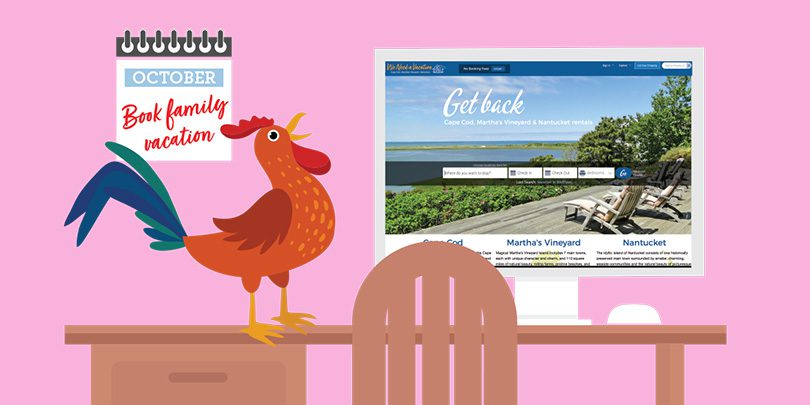Updated August 2023
With the pandemic years in our rear-view mirror, vacationers have been booking their rental homes much earlier in the booking season. Many want to secure a home as soon as possible, especially for the very popular mid-summer weeks, and they know that they’ll have more choices if they book early. It’s not unusual to see vacationers booking their next summer’s rental as far ahead as the previous July or August!
Here’s our advice about handling inquiries and bookings that occur prior to January of the rental year.
Be prepared
- Make sure your listing is active and up to date.
- Enter your pricing and availability for the following season, only marking dates as unavailable if you have received definite commitments/deposits from past guests.
- Determine your policy regarding repeat guests: How much time will you give them to commit? How much deposit will you require?
- Use Booking Management to record “tentative” bookings. A tentative status still keeps the calendar open in case the booking falls through.
- Remember to keep your calendar date stamp updated every few weeks.
- Be ready to respond to inquiries for long-term rentals as they are most likely to happen in the early part of the booking season. (Learn about some of the pros and cons of Longer-term Rentals.)
- Review your lease and especially your cancellation policy. You want to be sure to protect yourself when you are booking this far in advance.
Payment schedules for early bookings
We recommend that you require an initial deposit, along with a signed lease, to reserve your home. How much is up to you and might depend on the popularity of the weeks requested and the size of your home – both of which would justify a larger deposit (larger homes are more difficult to book at the last minute).
A common policy any time of year is to require 50% of the rent with the lease at time of booking, with the balance (rent, security deposit, and tax) due 45 – 90 days in advance. Another option for very early bookings is to require 1/3, 1/3, and 1/3, each at the dates of your choosing.
It is not a good idea to collect the lodging tax so far in advance. Things can change, so it’s best to require the lodging tax when the final balance is due.
If your home is on the Islands, ferry issues make it very difficult to rebook a late cancellation. So, you’ll want to require a big enough deposit to assure that your early bookings remain committed.
Tip: Remember, whatever funds you receive for the following season during the current calendar year must be included in your income for the current year, not the year of the rental.
Repeat guests
One of the greatest challenges with early inquiries comes from the desire to protect your valuable repeat guests. They are less risky and more apt to continue to return multiple times. Many homeowners are reluctant to ask for a commitment from their past guests too soon after they depart. However, given the current trend towards earlier bookings, it might be wise to ask them to commit early.
Here are a few options to consider
Shortly after your guest’s departure, let them know how much you enjoyed having them stay at your home, and that you will be renting your home again next year if they are interested in returning. A good practice is to include this in your follow-up email, when you also let them know that their security deposit is on its way back to them and you ask them for a guest review. If you are planning to raise your rates, perhaps offer them either the old price or a rate in between the old and the new.
Create a deadline by which you need to receive a commitment. But don’t be too lenient! In the past, some homeowners used to wait until January 1. But given the early booking trend, your reserving multiple weeks for past guests until then could result in many lost bookings if any of them decide not to return. It’s not unreasonable to require a commitment by September 15 or October 1.
You can also allow your repeat guests a “right of first refusal.” As soon as you receive a new inquiry for a week tentatively held for a repeat guest, respond right away that you just need to check with your former guests. Give your repeat guests 24-48 hours to commit, and then confirm either way to the new inquirers.
Just keep in mind that your delay in letting the new inquirer know could cost you that new booking as they may not be willing to wait. Often, they have inquired about other homes as well and are anxious to book.
Thus, you must judge the “value” of your repeat guest. What is the likelihood that they would return? If they are already a returning guest, you might prefer to give them a longer grace period to confirm than a guest who has stayed with you only once.
If your former guests do inform you that they’d like to return, be sure to require a deposit and a signed lease.
Super-early inquiries
Occasionally, vacationers will inquire over a year in advance. This means that current season guests haven’t even arrived in your home yet, so you can’t ask if they’d like to return next year. You are then faced with a choice. You could either accept the booking, or you could let them know that your policy is to allow your current season’s guests the option to return before you commit to future bookings. Offer to contact them within “x” days of the current guests’ departure.
Handling regular inquiries and bookings
For a more comprehensive look at booking techniques in general, read our post Successful Vacation Rental Booking Techniques.








This is an excellent commentary and advice. It is particularly helpful to us with regard to how to manage repeat guests while not disadvantaging prospects for new renters. Thank you! Don E, property manager for Barbara E
Thank YOU, Don! I’m so glad you found it helpful!